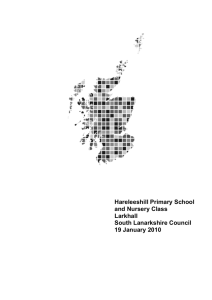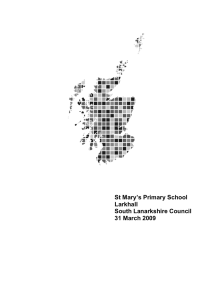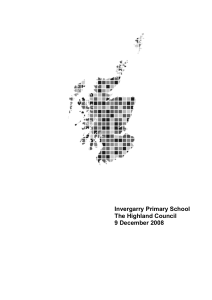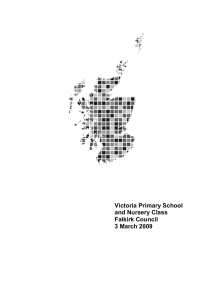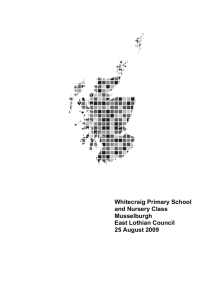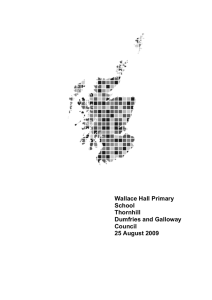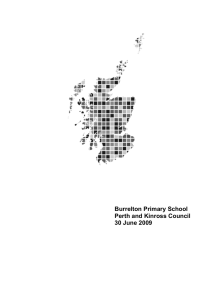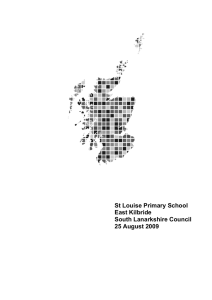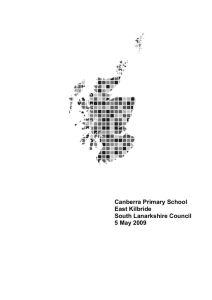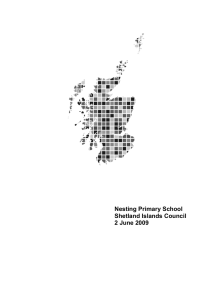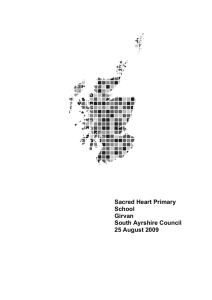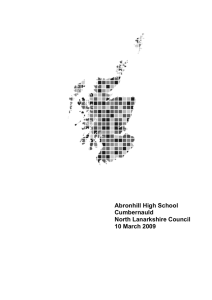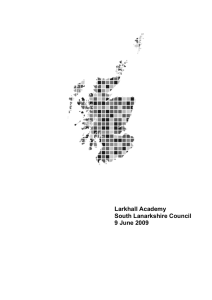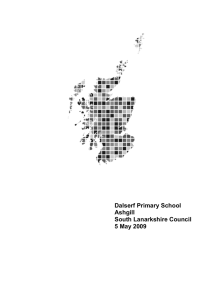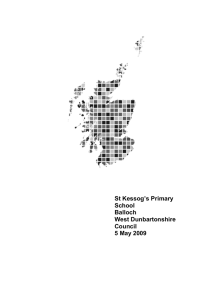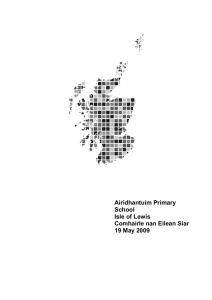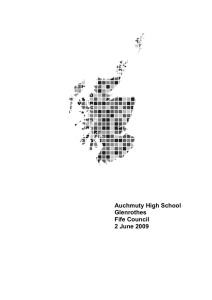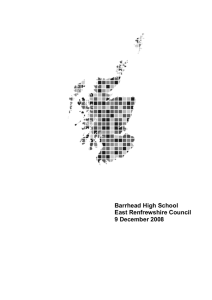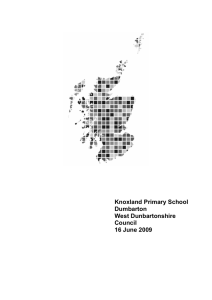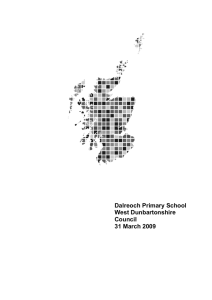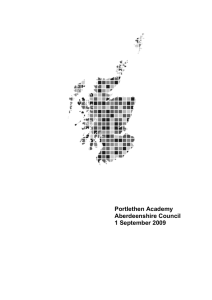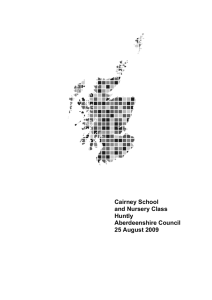Hareleeshill Primary School and Nursery Class Larkhall
advertisement
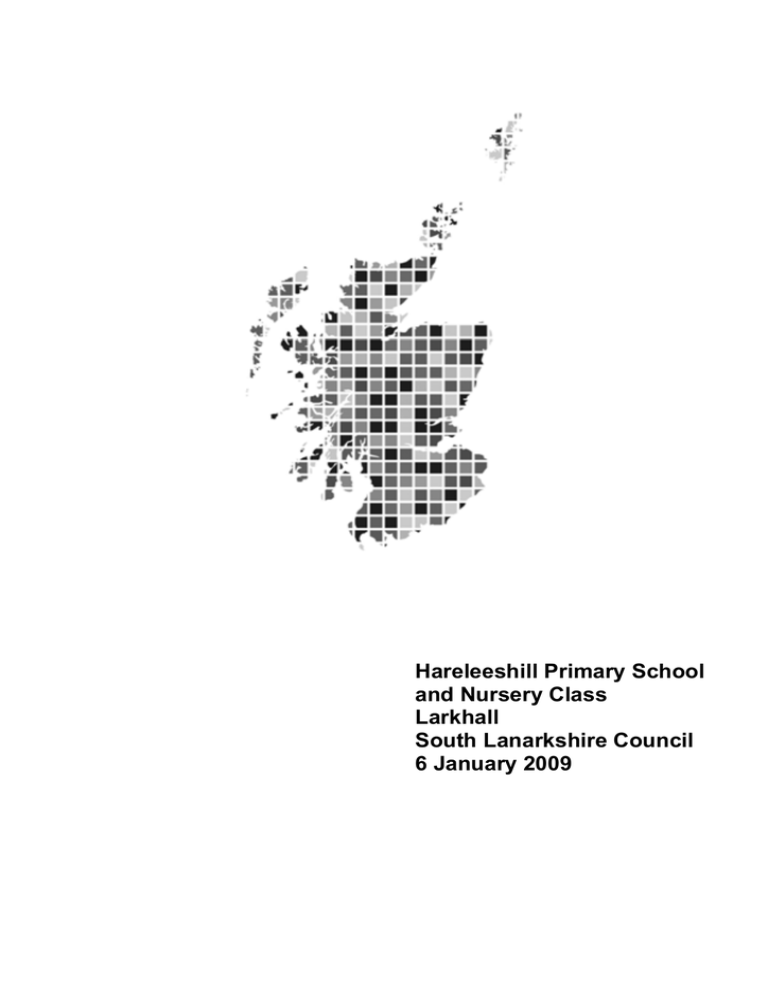
Hareleeshill Primary School and Nursery Class Larkhall South Lanarkshire Council 6 January 2009 We published a report on Hareleeshill Primary School and Nursery Class in January 2008. That report set out key strengths of the school and main points for action. This follow-through report is based on an inspection visit which was carried out in October 2008. It tells you about improvements since the original inspection in the quality of education which the school1 provides. It also comments on how the school is getting on with the main points for action. First we focus on changes in the core work of the school. We explain how the school has got better at helping children to learn and benefit from being at the school. Next we look at the key processes which enable this to happen, including the involvement of parents2. Our report also describes developments in the ‘ethos’ of the school, by which we mean how well children are cared for and how much is expected of them in all aspects of school life. Finally we comment on improvements in leadership to help the school achieve its aims. A copy of this report has been placed on the HMIE website www.hmie.gov.uk. Where applicable, you will also find descriptions of good practice in the school and analyses of questionnaire returns. 1 2 The term ‘school’ is used to include the work of the nursery class, where relevant. Throughout this report, the term ‘parents’ should be taken to include foster carers, residential care staff and carers who are relatives or friends. Contents 1. The school 2. Particular strengths of the school 3. How well do children learn and achieve? 4. How well do staff work with others to support children's learning? 5. Are staff and children actively involved in improving their school community? 6. Does the school have high expectations of all children? 7. Does the school have a clear sense of direction? 8. What happens next? 1. The school Hareleeshill Primary School and Nursery Class serves the Hareleeshill area of Larkhall. It forms part of the Larkhall Learning Community. There have been no significant changes since the last inspection in the school roll, attendance and number of children entitled to free school meals. Following the original inspection, the headteacher retired. A new headteacher took up post in January 2008 and a new depute headteacher in May 2008. 1 2. Particular strengths of the school • Polite, well-behaved children. • Promising start made by school in taking forward new approaches to learning and teaching. • Positive impact of headteacher in leading school improvement. 3. How well do children learn and achieve? Children’s progress is beginning to improve. They are interested and enthusiastic in lessons. They now have more opportunities to be actively involved in tasks and activities. They are more aware of what they are learning and what they can do to improve. Teachers provide a broader range of learning experiences and share the purposes of lessons with children. At P1 and P2 there is more emphasis on learning through play. Teachers are now giving children tasks and activities in English language and mathematics which take better account of their individual needs. Children in the support classes now have more opportunities to be included in tasks and activities alongside children from other classes. Children are making more use of information and communications technology (ICT) to develop their knowledge and understanding, particularly in mathematics. Teachers track children’s progress in talking and listening more closely. There are early signs of improved attainment in English language and mathematics. Children now receive two hours of quality physical activity each week and are involved in a wider range of out-of-school-hours activities including: indoor curling; football; dancing; keep fit; athletics and choir. The school has improved transition arrangements for children coming from nursery into primary. 2 4. How well do staff work with others to support children's learning? Teachers are working effectively in school teams and with colleagues in the learning community to improve programmes of study. They are taking good account of the national initiative A Curriculum for Excellence. The new headteacher has played a strong role in setting up a new system to identify children’s learning needs quickly and to meet them. Teachers have started to develop further their knowledge and skills in supporting the learning needs of individual children. Learning assistants now work more often in classes, alongside teachers, to support children’s learning. Staff from network support and partner agencies provide high quality assistance to class teachers in supporting children’s learning needs. Parents are more involved in attending review meetings and in discussing targets for those children with individualised educational programmes (IEPs). A number of parents are working alongside teachers to support children’s learning in classes. 5. Are staff and children actively involved in improving their school community? Children are developing well as citizens. Children, parents and staff jointly support a wide range of charities. Older children successfully support younger ones, helping them at morning intervals and lunchtimes. Staff are increasingly active in improving the school through working groups and taking forward school improvement. Managers regularly discuss teaching and learning with teachers and give advice and support. Teachers have begun to visit each other’s classes and other schools to observe different teaching methods and share what they are doing. These initiatives are already helping to improve the quality of children’s learning. 3 6. Does the school have high expectations of all children? There are signs of improvement in the expectations of all staff of children’s achievements. Teachers are now following children’s progress in English language and mathematics more closely and setting targets for them to achieve earlier. Teachers regularly discuss children’s progress with school managers. Children are benefiting from being involved in tasks which require them to be more independent in their learning. Children’s achievements are celebrated in displays, through newsletters and at assemblies. 7. Does the school have a clear sense of direction? The new headteacher has a clear vision for the school. She has made a very strong start to taking forward school improvements. She has the full support of staff and is ably supported by two depute headteachers and a principal teacher. Together, school managers have successfully involved staff and parents in taking forward an ambitious improvement plan. All staff are working hard to address improvement priorities and to provide a better education for the children. The education authority has provided very useful help to the school in moving forward. 8. What happens next? Overall, Hareleeshill Primary School and Nursery Class has made a very promising start to tackling areas identified for improvement. As set out in the original report, HM Inspectors will return to carry out a further follow-through inspection within one year of the publication of this report. Parents will receive a further report following that inspection. HM Inspector: June Orr 6 January 2009 4 To find out more about inspections or get an electronic copy of this report go to www.hmie.gov.uk. Please contact the Business Management and Communications Team (BMCT) if you wish to enquire about our arrangements for translated or other appropriate versions. If you wish to comment about any of our inspections, contact us at HMIEenquiries@hmie.gsi.gov.uk or alternatively you should write in the first instance to BMCT, HM Inspectorate of Education, Denholm House, Almondvale Business Park, Almondvale Way, Livingston EH54 6GA. Our complaints procedure is available from our website www.hmie.gov.uk or alternatively you can write to our Complaints Manager, at the address above or by telephoning 01506 600259. If you are not satisfied with the action we have taken at the end of our complaints procedure, you can raise your complaint with the Scottish Public Services Ombudsman (SPSO). The SPSO is fully independent and has powers to investigate complaints about Government departments and agencies. You should write to the SPSO, Freepost EH641, Edinburgh EH3 0BR. You can also telephone 0800 377 7330, fax 0800 377 7331 or e-mail: ask@spso.org.uk. More information about the Ombudsman’s office can be obtained from the website at www.spso.org.uk. Crown Copyright 2009 HM Inspectorate of Education
